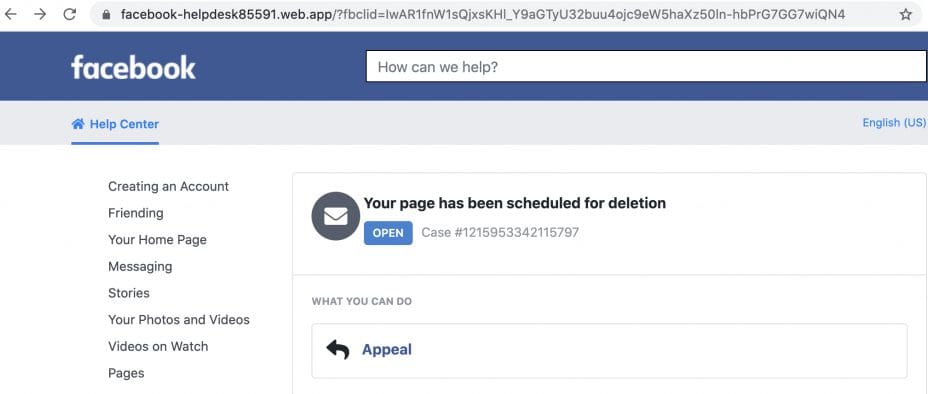Huge increase in phishing attacks on Facebook Pages – Act now

Huge increase in phishing attacks on Facebook Pages - Act now
In recent months, owners of Facebook pages have been literally inundated with false messages, including bands of course. These attacks, often phishing attempts, use deceptive messages claiming that the victim’s Facebook page is “scheduled for deletion” due to alleged violations of community guidelines.
Here are some examples of messages that landed our inbox in the past few days, and were even sent via notification emails by Facebook itself.

Below is one of those messages, including an external – obviously fake – link.

But the more clever scams happen via a message holding a link to a fake Facebook note page named “Appeal a Page Policy Violation”. Everything looks legitimate, but it is not.

Once on the fake help page, users are redirected via an external link (just hover over the link to see the external link to verify) to a counterfeit Facebook help desk page. All buttons and links on this page do not work, except for the “Appeal” button.

By clicking this button, a form is opened where users are asked to enter personal information, such as login email addresses, phone numbers, names, and page names. The information submitted falls into the hands of scammers, who can then pose as Facebook officials and mislead users into providing their login details. This gives the scammers access to the victim’s Facebook account and their fan pages, or they can use the information for other scams, such as identity theft. Sometimes they will also ask for credit card details to ‘verify’ your identity.

Furthermore, there is a chance that they will try to install keylogger software on your computer. A keylogger is a program that can record a computer user’s keystrokes to even mouse movements. This way, they try to steal personal information, often passwords and usernames or credit card numbers.
What can you do to prevent these phishing attempts?
To prevent such phishing scams, we advise you to pay special attention to the web address; a legitimate Facebook official page should always start with facebook.com, if you see a different URL, then delete the message. Also, always contact Facebook directly for help instead of using links from others.
The following preventive measures are best taken:
- Be cautious with links: Do not click on suspicious links, especially in messages claiming to be from Facebook and threatening page deletion.
- Enable two-factor authentication: This adds an extra layer of security to your account.
- Be critical: Be careful with unsolicited messages or emails that require action, such as clicking on links or providing personal information.
- Update your privacy settings: Adjust your privacy settings to control who can see your messages and contact you.
- Inform yourself: Stay informed about the latest scam methods and inform your team or co-administrators of your page on how to recognize and prevent them.
- Limit the number of administrators of your Facebook page. Only those with sufficient knowledge should have access.
What can you do if your Facebook Page account was actually hacked?
The social media agency FOX DS has been contacted several times by page owners who are at their wits’ end when their page was hacked. They say clearly that “prevention is better than cure, as success is absolutely not guaranteed.” However, it is very important to act quickly to limit the damage.
First, you must seek help from Facebook to get your page back. This is not easy, as the help pages are quite hidden. Here are some steps (and links) you need to take to regain access:
- Change your password: If you still have access to your account, change your password immediately. This helps prevent the scammers from further controlling your account.
- Report the hacking to Facebook: Use the Facebook Hacked account report to report this incident and this Business support page to try to regain access to your page. Facebook offers a process to help you regain control of your account. Be aware, there is no guarantee that this will work.
- Recover your account: Follow Facebook’s instructions for account recovery. This may include answering security questions or providing identification documents.
- Check your account settings: After you have regained access, check your account settings to ensure that no suspicious changes have been made.
- Contact your network: Inform your friends and followers about the breach and warn them not to interact with suspicious messages that may have been sent from your account.
- Secure your account: Set up two-factor authentication and update your security settings to prevent future breaches.
As said before, there is no guarantee that this will work.
Since you’re here …
… we have a small favour to ask. More people are reading Side-Line Magazine than ever but advertising revenues across the media are falling fast. Unlike many news organisations, we haven’t put up a paywall – we want to keep our journalism as open as we can - and we refuse to add annoying advertising. So you can see why we need to ask for your help.
Side-Line’s independent journalism takes a lot of time, money and hard work to produce. But we do it because we want to push the artists we like and who are equally fighting to survive.
If everyone who reads our reporting, who likes it, helps fund it, our future would be much more secure. For as little as 5 US$, you can support Side-Line Magazine – and it only takes a minute. Thank you.
The donations are safely powered by Paypal.




